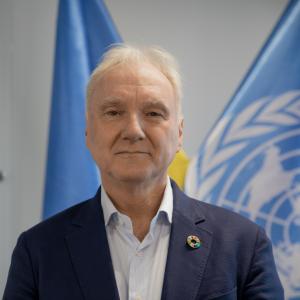Today, we solemnly observe International Day for the Elimination of Conflict-Related Sexual Violence.
I am speaking from the office of Numo, Sestry – one of the four survivor-led civil society organizations supported by UN women.
As the war on Ukraine by the Russian Federation is in its 4th year, the United Nations stand in solidarity with survivors and we reaffirm our commitment to justice, dignity, and accountability.
Between February 2022- December 2024, the United Nations in Ukraine has documented 433 cases of conflict-related sexual violence, perpetrated against 302 men, 119 women, 10 girls and 2 boys. These figures do not reflect the full scale or prevalence of this chronically underreported and hidden crime. Stigma, insecurity, social pressures, and a lack of services keep many survivors from coming forward.
The UN has mobilized significant resources and expertise to advance work on legislative reform, the establishment of a reparations system, providing comprehensive services to survivors, and enhancing the national capacity to apply trauma-informed approaches to investigations and prosecutions. The UN has helped establish the Survivor Relief Platform and Centres across the country to provide essential services and information to survivors.
We remain committed to a survivor-centered approach and amplifying the voices of survivors. This is particularly important for male survivors, as services and understanding of their unique needs tend to be more limited.
Despite considerable success, several challenges are yet to be addressed.
- Many cases of conflict-related sexual violence go unreported. Survivors remain silent out of fear and shame. They are oftentimes not aware that, beyond rape, other forms of sexual violence they have been subjected to are also international crimes for which they can seek services and demand accountability and reparations.
- The highly volatile security situation in frontline areas makes it difficult, if not impossible for independent human rights monitors to reach and speak with survivors to document their harsh reality.
- Healthcare facilities and safe spaces in rural and areas affected by the war are often ill-equipped to respond to the specialized needs of conflict-related sexual violence survivors, and in particular, male survivors.
- Many essential women’s rights and survivor-led organizations now operate on limited funding.
Survivors must feel safe and supported when they go to court. Clear rules must be set for investigating and prosecuting cases, including minimum standards on the rights, support and protection of survivors, and the right of every survivor to reparations.
We commend the Government of Ukraine in advancing justice for survivors, in coordination with survivor-led and women’s rights organizations.
We renew our call to the global community to invest in long-term support for national justice systems and international accountability, to end impunity, protect survivors, and prevent future violations.



